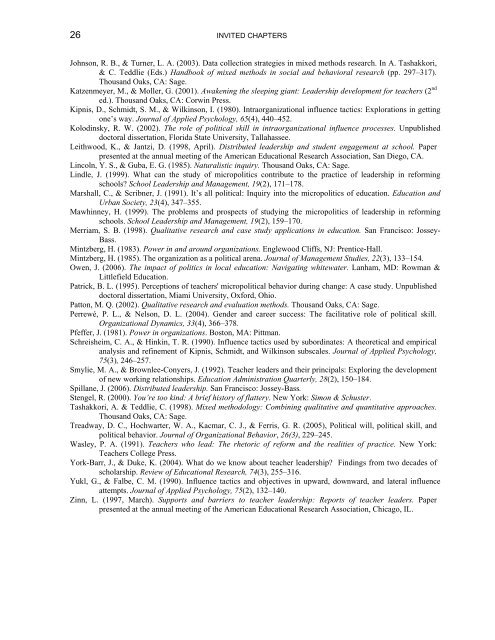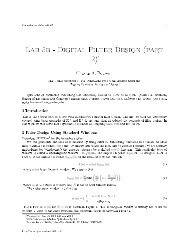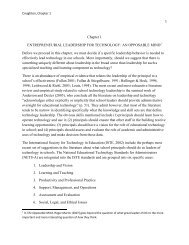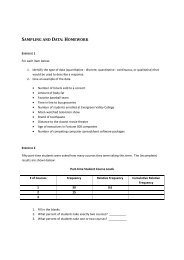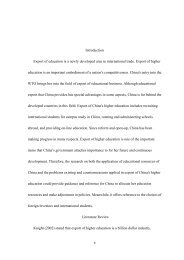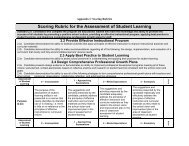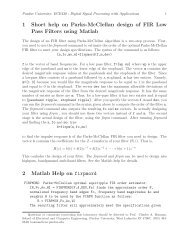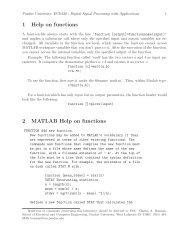Blazing New Trails - Connexions
Blazing New Trails - Connexions
Blazing New Trails - Connexions
You also want an ePaper? Increase the reach of your titles
YUMPU automatically turns print PDFs into web optimized ePapers that Google loves.
26 INVITED CHAPTERS<br />
Johnson, R. B., & Turner, L. A. (2003). Data collection strategies in mixed methods research. In A. Tashakkori,<br />
& C. Teddlie (Eds.) Handbook of mixed methods in social and behavioral research (pp. 297–317).<br />
Thousand Oaks, CA: Sage.<br />
Katzenmeyer, M., & Moller, G. (2001). Awakening the sleeping giant: Leadership development for teachers (2 nd<br />
ed.). Thousand Oaks, CA: Corwin Press.<br />
Kipnis, D., Schmidt, S. M., & Wilkinson, I. (1980). Intraorganizational influence tactics: Explorations in getting<br />
one’s way. Journal of Applied Psychology, 65(4), 440–452.<br />
Kolodinsky, R. W. (2002). The role of political skill in intraorganizational influence processes. Unpublished<br />
doctoral dissertation, Florida State University, Tallahassee.<br />
Leithwood, K., & Jantzi, D. (1998, April). Distributed leadership and student engagement at school. Paper<br />
presented at the annual meeting of the American Educational Research Association, San Diego, CA.<br />
Lincoln, Y. S., & Guba, E. G. (1985). Naturalistic inquiry. Thousand Oaks, CA: Sage.<br />
Lindle, J. (1999). What can the study of micropolitics contribute to the practice of leadership in reforming<br />
schools? School Leadership and Management, 19(2), 171–178.<br />
Marshall, C., & Scribner, J. (1991). It’s all political: Inquiry into the micropolitics of education. Education and<br />
Urban Society, 23(4), 347–355.<br />
Mawhinney, H. (1999). The problems and prospects of studying the micropolitics of leadership in reforming<br />
schools. School Leadership and Management, 19(2), 159–170.<br />
Merriam, S. B. (1998). Qualitative research and case study applications in education. San Francisco: Jossey-<br />
Bass.<br />
Mintzberg, H. (1983). Power in and around organizations. Englewood Cliffs, NJ: Prentice-Hall.<br />
Mintzberg, H. (1985). The organization as a political arena. Journal of Management Studies, 22(3), 133–154.<br />
Owen, J. (2006). The impact of politics in local education: Navigating whitewater. Lanham, MD: Rowman &<br />
Littlefield Education.<br />
Patrick, B. L. (1995). Perceptions of teachers' micropolitical behavior during change: A case study. Unpublished<br />
doctoral dissertation, Miami University, Oxford, Ohio.<br />
Patton, M. Q. (2002). Qualitative research and evaluation methods. Thousand Oaks, CA: Sage.<br />
Perrewé, P. L., & Nelson, D. L. (2004). Gender and career success: The facilitative role of political skill.<br />
Organizational Dynamics, 33(4), 366–378.<br />
Pfeffer, J. (1981). Power in organizations. Boston, MA: Pittman.<br />
Schreisheim, C. A., & Hinkin, T. R. (1990). Influence tactics used by subordinates: A theoretical and empirical<br />
analysis and refinement of Kipnis, Schmidt, and Wilkinson subscales. Journal of Applied Psychology,<br />
75(3), 246–257.<br />
Smylie, M. A., & Brownlee-Conyers, J. (1992). Teacher leaders and their principals: Exploring the development<br />
of new working relationships. Education Administration Quarterly, 28(2), 150–184.<br />
Spillane, J. (2006). Distributed leadership. San Francisco: Jossey-Bass.<br />
Stengel, R. (2000). You’re too kind: A brief history of flattery. <strong>New</strong> York: Simon & Schuster.<br />
Tashakkori, A. & Teddlie, C. (1998). Mixed methodology: Combining qualitative and quantitative approaches.<br />
Thousand Oaks, CA: Sage.<br />
Treadway, D. C., Hochwarter, W. A., Kacmar, C. J., & Ferris, G. R. (2005), Political will, political skill, and<br />
political behavior. Journal of Organizational Behavior, 26(3), 229–245.<br />
Wasley, P. A. (1991). Teachers who lead: The rhetoric of reform and the realities of practice. <strong>New</strong> York:<br />
Teachers College Press.<br />
York-Barr, J., & Duke, K. (2004). What do we know about teacher leadership? Findings from two decades of<br />
scholarship. Review of Educational Research, 74(3), 255–316.<br />
Yukl, G., & Falbe, C. M. (1990). Influence tactics and objectives in upward, downward, and lateral influence<br />
attempts. Journal of Applied Psychology, 75(2), 132–140.<br />
Zinn, L. (1997, March). Supports and barriers to teacher leadership: Reports of teacher leaders. Paper<br />
presented at the annual meeting of the American Educational Research Association, Chicago, IL.


